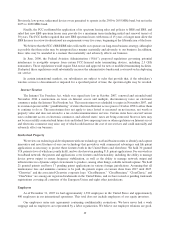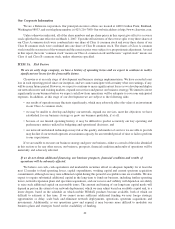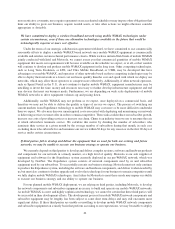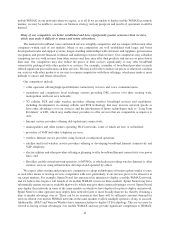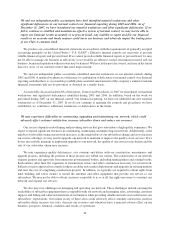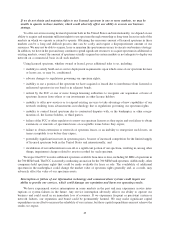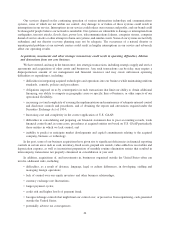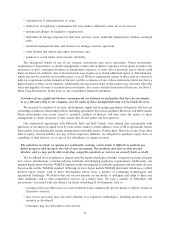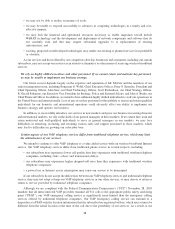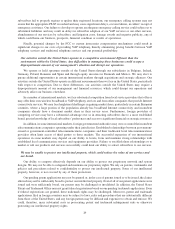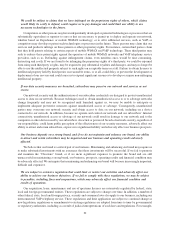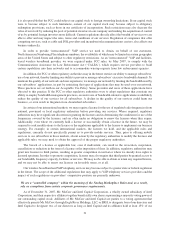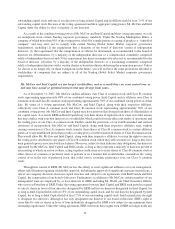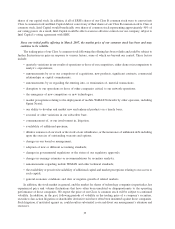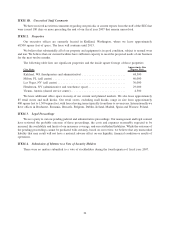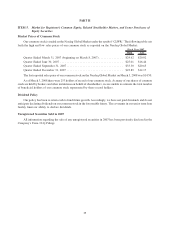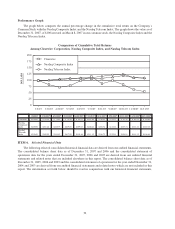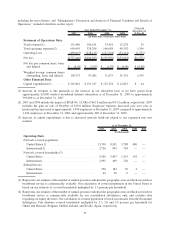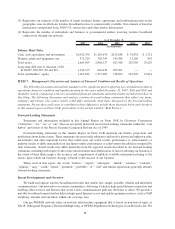Clearwire 2007 Annual Report Download - page 37
Download and view the complete annual report
Please find page 37 of the 2007 Clearwire annual report below. You can navigate through the pages in the report by either clicking on the pages listed below, or by using the keyword search tool below to find specific information within the annual report.subscribers fail to properly register or update their registered locations, our emergency calling systems may not
assure that the appropriate PSAP is reached and may cause significant delays, or even failures, in callers’ receipt of
emergency assistance. Our failure to develop or operate an adequate emergency calling service could subject us to
substantial liabilities and may result in delays in subscriber adoption of our VoIP services or our other services,
abandonment of our services by subscribers, and litigation costs, damage awards and negative publicity, any of
which could harm our business, prospects, financial condition or results of operations.
Finally, potential changes by the FCC to current intercarrier compensation mechanisms could result in
significant changes to our costs of providing VoIP telephony, thereby eliminating pricing benefits between VoIP
telephony services and traditional telephone services and our potential profitability.
Our activities outside the United States operate in a competitive environment different than the
environment within the United States. Any difficulties in managing these businesses could occupy a
disproportionate amount of our management’s attention and disrupt our operations.
We operate or hold spectrum outside of the United States through our subsidiaries in Belgium, Ireland,
Germany, Poland, Romania and Spain and through equity investees in Denmark and Mexico. We may elect to
pursue additional opportunities in certain international markets through acquisitions and strategic alliances. Our
activities outside the United States operate in different environments than we face in the United States, particularly
with respect to competition. Due to these differences, our activities outside the United States may require a
disproportionate amount of our management and financial resources, which could disrupt our operations and
adversely affect our business elsewhere.
In a number of international markets, we face substantial competition from local service providers that offer or
may offer their own wireless broadband or VoIP telephony services and from other companies that provide Internet
connectivity services. We may face heightened challenges in gaining market share, particularly in certain European
countries, where a large portion of the population already has broadband Internet connectivity and incumbent
companies already have a dominant market share in their service areas. Furthermore, foreign providers of
competing services may have a substantial advantage over us in attracting subscribers due to a more established
brand, greater knowledge of local subscribers’ preferences and access to significant financial or strategic resources.
In addition, in some international markets, foreign governmental authorities may own or control the incumbent
telecommunications companies operating under their jurisdiction. Established relationships between government-
owned or government-controlled telecommunications companies and their traditional local telecommunications
providers often limit access of third parties to these markets. The successful expansion of our international
operations in some markets may depend on our ability to locate, form and maintain strong relationships with
established local communication services and equipment providers. Failure to establish these relationships or to
market or sell our products and services successfully could limit our ability to attract subscribers to our services.
We may be unable to protect our intellectual property, which could reduce the value of our services and
our brand.
Our ability to compete effectively depends on our ability to protect our proprietary network and system
designs. We may not be able to safeguard and maintain our proprietary rights. We rely on patents, trademarks and
policies and procedures related to confidentiality to protect our intellectual property. Some of our intellectual
property, however, is not covered by any of these protections.
Our pending patent applications may not be granted or, in the case of patents issued or to be issued, the claims
allowed may not be sufficiently broad to protect our intellectual property. Even if all of our patent applications were
issued and were sufficiently broad, our patents may be challenged or invalidated. In addition, the United States
Patent and Trademark Office may not grant federal registrations based on our pending trademark applications. Even
if federal registrations are granted, these trademark rights may be challenged. Moreover, patent and trademark
applications filed in foreign countries may be subject to laws, rules and procedures that are substantially different
from those of the United States, and any foreign patents may be difficult and expensive to obtain and enforce. We
could, therefore, incur substantial costs in prosecuting patent and trademark infringement suits or otherwise
protecting our intellectual property rights.
29


